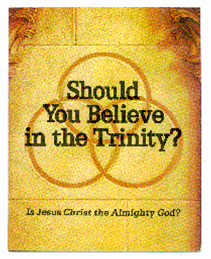In the New Testament we find the clear teaching of one God. (1 Timothy 2:5).
At the same time we are told the Father is God (Romans 1:7), the Son is God (John 20:28), and the Holy Spirit is God (Acts 5:3,4).
The New Testament writers do not give a systematic definition of how the Three are One. The Trinity, like other doctrines, is arrived at by taking all the scripture that speak of God and finding the balance. However, this process was forced on the Church by heretical views. Augustus Strong’s Systematic Theology, says of the early Church Fathers,
“They held it, as it were in solution; only time, reflection, and the shock of controversy and opposition caused it to crystallize into definite and dogmatic form” (p. 304).
The writings of the Apostles are the first line of evidence for the Trinity. The second line is found in the writings of the second generation of Church leaders after the Apostles.
Looking back from our vantage point today we would naturally give greater importance to the writings of those men who received their instruction directly from the Apostles.
The farther one gets away from the source the more potential there is for error.
This is exactly the claim made by the Watchtower. They teach that orthodoxy was taught by the Apostles, but as time passed the heresies so corrupted the faith that by the time of the Council of Nicaea in 325 A.D. the heretics had enough strength to enforce their views.If the Jehovah’s Witnesses were correct in their view we would expect such men as Polycarp and Ignatius, who were pupils of the Apostle John, to agree with the Watchtower in its claim that Jesus is not God. But, both men strongly affirmed the full deity of Jesus.
Polycarp called Jesus “our Lord and God” (The Apostolic Fathers, Lightfoot, p. 99).
Ignatius said, “For our God, Jesus the Christ, was conceived in the womb of Mary” (Ibid, p. 67).
Many quotes such as these by the early Church Fathers could be produced.
This issue came to the fore with the publication by the Watchtower of their anti-trinity pamphlet titled Should You Believe In The Trinity.
Anyone who lacks a good biblical foundation of evidences for the Trinity will be confused, or deceived, by this pamphlet. The reason it can be dangerous to such people is because it draws heavily from quotes by the early Church Fathers, liberal and conservative scholars, and encyclopedias to show that those who should know best don’t believe the doctrine is biblical.
The problem in this pamphlet is that the quotes, except for the liberal anti-supernatural writers, are invariably out of context. By the abundant use of ellipses (…) quotes are doctored to say the opposite of what the writer intended.

By David Henke






